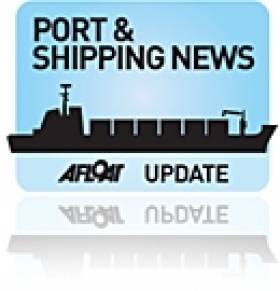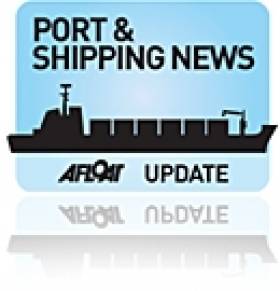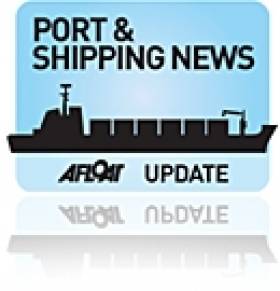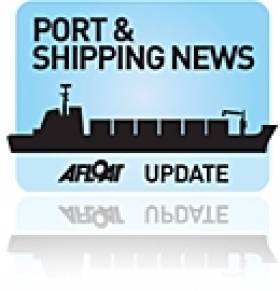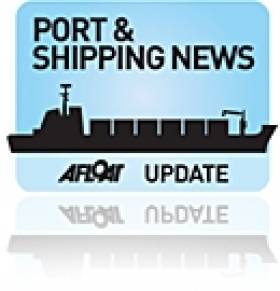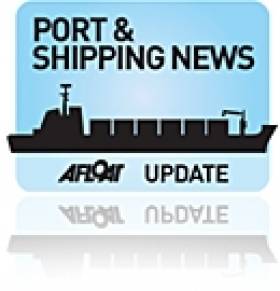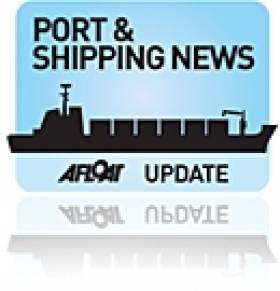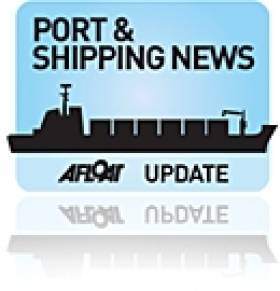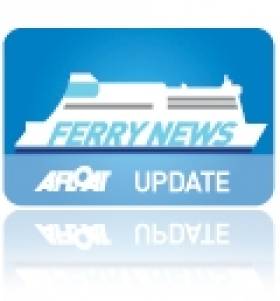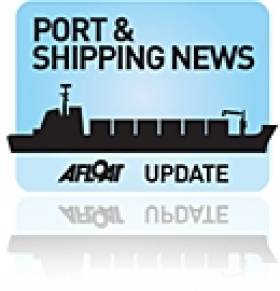Displaying items by tag: Ports & Shipping news
#Ports&ShippingReview – Over the last fortnight, Jehan Ashmore has reported on the shipping scene where Irish ports and shipping volumes rose 6% in Q1 of 2015 compared to same period of 2014 according to the Irish Maritime Development Office (IMDO).
EPSO presented its views on Mid-Term review of 2011 White Paper on transport, the organisation said they must feed the review process started by European Commission which should result in "adjustment" or "review" of the strategic document of 2011.
CMA-CGM implements a War Risk Surcharge on all shipments to Hodeidah, Yemen, with charges of US$300 per 20-foot and $600 per 40-foot containers.
Up to €40 million is sought from investors to commit in a major upgrade of Rosslare Europort. The investment will equip the port operated by Iarnród Éireann to handle the ships of the future.
#Ports&Shipping – The latest Irish Maritime Development Office (IMDO) Weekly Market Review includes the following stories outlined below.
Irish Maritime News: 10,000 Marine Jobs by 2020- The Expert Group on Future Skills Needs (EGFSN) has advised the Government to upskill younger workers to support the 10,000 new jobs the marine economy will create by 2020.
Ardmore Shipping Corporation Announces - Financial Results for Quarter 1 2015 -Ardmore reported EBITDA (Earnings before interest, taxes, depreciation, and amortization) of $12.2 million for the three months ended March 31, 2015, an increase of $8.2 million from $4.0 million for the three months ended March 31, 2014.
US Awards First Cuba Ferry Permits - Up to six companies have been awarded licences to operate ferry services between the US and Cuba, the first in more than 50 years. It is understood that the licences are broad in scope, leaving specific routes, frequencies and number of vessels open and apparently up to the operator.
For more of each of the above stories and much more click the IMDO Market Review (Week 19) here.
In addition to further dedicated coverage visit Afloat.ie's Ports & Shipping news.
Investors Sought to Upgrade Rosslare Europort
#RosslarePort - The Wexford People writes that up to €40 million is sought from investors to commit in a major upgrade of Rosslare Europort that will equip it to handle the ships of the future.
Iarnród Éireann, the Port Authority for Rosslare Europort, announced to port staff last week that it is to undertake an assessment of market interest in a concession with a third party to operate the Port.
The assessment follows a study by Indecon Consultants for the Department of Transport, Tourism & Sport which examined strategic options for the future of the Europort, to maximise its potential and address future investment requirements.
The report recommended that the Europort remain in the ownership of Iarnród Éireann, but with a long term concession with a third party.
Iarnród Éireann briefed all 73 employees at the port and will now commence the process of consulting with the market to assess interest and evaluate opportunities from a concession structure, which would be commonplace in ports in the EU and beyond.
Rosslare Europort is Ireland's second busiest in terms of ship visits and unitised freight, and is designated as one of only five ports of national significance in the National Ports Policy.
The Port has recorded growth of four per cent in freight units in 2015 to date, on top of a two per cent growth in 2014.
For more on this story, click here.
Container Giant Applies Yemen War-Charge Surcharge
#WarRiskSurcharge – The world's third largest container shipping operator CMA-CGM has announced the implementation of a War Risk Surcharge on all shipments to Hodeidah, Yemen.
The charges of US$300 per 20-foot and $600 per 40-foot containers are applicable with immediate effect.
CMC-CGM said: "For all cargo already discharged in Hodeidah, or at sea on the way to be discharged in Hodeidah coming from Jeddah or Djibouti, or from initial port of loading, this surcharge will be collected by our agent in Hodeidah.
"For all new bookings to Hodeidah, this surcharge will be prepaid by shippers at the port of loading."
Also according to Lloyds Loading List, the giant French owned shipping group quadrupled 2015 profits for Q1.
The sharp drop in bunker prices provided a major boost to container shipping group CMA CGM in the first quarter, helping to drive a fourfold increase in net profits to $406 million, despite the volatility on Asia-Europe lanes since Chinese New Year.
Volumes rose 10.5% in the period to 3.1 million TEU, chiefly from the increase in volumes on the East-West lines, particularly to and from the US, where volumes enjoyed sustained growth, and also from the launch of the Ocean Three Alliance.
The group continued to actively optimise its services, opening five new routes in the US and extending its agency network up to 655 agencies in over 160 countries.
For much more click HERE.
#Ports&Shipping – The latest IMDO Weekly Market Review includes the following stories outlined below.
Irish Maritime News: National Ports Bill Enactment - Minister for Transport, Tourism & Sport, Paschal Donohoe will publish a new Bill as reported on Afloat.ie to provide for the transfer to local authority control of the five Ports of Regional Significance – Drogheda, Dún Laoghaire, Galway, New Ross and Wicklow.
The Bill will also make improvements to the board appointment process, such as introducing statutory skillsets and term limits which will improve the overall corporate governance of the sector.
Global Maritime News: Indian Cabinet clears Merchant Shipping Bill - The Indian Union Cabinet has given its approval for the introduction of the Merchant Shipping (Amendment) Bill, 2015, in line with a global convention, to protect environment and human health from ballast water and sediments used in ships, which can include harmful aquatic organisms and pathogens.
Container Market: US West Coast Containership Congestion - During February and March the containership capacity delayed outside the five largest US West Coast ports reached over 0.2m TEU, equivalent to 1.2% of the containership fleet. These delays led to a number of cargo diversions away from the West Coast, and a wider impact on the boxship sector. As a result of this congestion, throughput at the major West Coast ports contracted in early 2015, falling by 19% y-o-y in the first two months.
Emissions: Big data helps shipping lines cut fuel bills and emissions -By focusing on operational improvements, shipping companies are reducing fuel consumption, saving money and cutting greenhouse emissions, while continuing to increase the amount of freight transported.
Irish Business News: Exports by Irish Companies Hits All Time High - It has been reported by Government that exports by Irish companies increased by 10% during 2014 to hit an all-time high of €18.6bn. This growth was recorded in exports to all international markets and across all sectors, according to the official figures published by Enterprise Ireland.
For more of each of the above stories and much more click the IMDO Market Review (Week 18) here.
In addition to further dedicated coverage visit Afloat.ie's Ports & Shipping news.
#ESPOconference2015 - Gathering in the Greek capital, Athens for the 12th edition of its Annual Conference, ESPO yesterday to present its views on the Mid-Term review of the 2011 White Paper on transport.
This position paper must feed the review process recently started in the European Commission, which should result in an "adjustment" or "review" of the strategic document of 2011.
To understand ESPO's priorities, it is important to explain that European ports are real "multitaskers": they combine different functions ranging from gateway to the world, nodes in the transport chain, hotspots for Europe's industrial activity, safe and secure shelters, the link between Europe's peripheral regions and islands to the mainland, key players in the transport of passengers, nodes of energy, facilitators for different other sectors and sometimes an essential part of an emergency supply chain.
The Commission wants to know if the challenges identified in 2011 are still valid. The main challenges European ports have identified are: growing traffic volumes which are more and more clustered; ever-increasing ships size and the cost of subsequent adaptation of port and port-hinterland infrastructure; increasing market power of shipping lines as a result of alliances ; national budget constraints limiting the possibilities of public funding for transport infrastructure; volatility in energy prices, the new energy landscape and the transition to alternative fuels; entry into force of the stricter sulphur limits in ECA countries; an increasing societal and environmental pressure; potential changes in shipping routes; the geo-political situation; further globalisation of business and society and the remaining barriers to the internal market for maritime transport.
Taking account of these challenges, ESPO believes that the main Vision of the 2011 White Paper, which recognizes the growth of mobility and transport, is more than ever valid and supports the ambitious target of reducing GHG emissions by 60%. But, for European ports the modal shift policy has not really delivered. Transport policy should aim at shifting towards an efficient, sustainable and smart mobility for all modes of transport.
For ESPO, three guiding principles are of outermost importance to pave the way to a competitive and resource-efficient transport system:
Coherence and coordination between EU transport policy and other EU policies,
Need for a long-term vision and
Be sure that EU action is always assessed in a global context.
ESPO identifies a range of proposals and priorities, amongst others:
ESPO pleads for a ports policy that empowers Europe's ports to meet tomorrow's challenges. ESPO members can accept a legislative framework that respects the diversity of European ports and that recognizes the autonomy of a port authority to set its own charges and to define a minimum quality level for its service providers. Such a framework has to take into account the specific character and features of ports, when applying the freedom to organise and provide services. Finally, the European ports policy has to ensure financial transparency where ports receive public funding for their infrastructure and/or operations.
As regards state aid to ports, EU policy makers should provide a pragmatic, predictable and stable environment for port authorities. The EU should also take a consistent approach in the assessment of EU funding and national/regional funding of transport infrastructure.
The new TEN-T guidelines and Connecting Europe Facility are seen as the most important achievement of the White Paper so far. The TEN-T framework adopted in 2013 should remain the cornerstone of Europe's Transport Infrastructure policy for the coming decades and this ambitious transport infrastructure plan and its financial envelope should be further defended. ESPO is further seeking further clarification as regards the added value of being a comprehensive port in the TEN-T network.
For ESPO, it is time to lift the maritime frontiers of the European Union. Of all modes, the internal market for maritime transport is the least developed.
The implementation of the Directive on the Reporting formalities is encountering different obstacles. To make progress, ESPO proposes to follow a concrete approach focusing on the standardization of the way similar data requirements are introduced, assessment of the added value and necessity of existing formalities, respect for well-functioning Port Community Systems, better cooperation between maritime and customs authorities of the member states and cooperation between DG TAXUD and the national customs authorities to develop a solution for giving EU status to goods transported by sea.
European ports can play a crucial role in moving towards a low-carbon transport system and economy. In that context, ESPO asks the European Commission to encourage investments in maritime ports that enhance the role of alternative fuels and energy. Moreover, European ports can play an important role in securing the supply of energy for transport and power generation. ESPO therefore hopes that European policy makers are considering European seaports as important interlocutors when paving the way for a European Energy Union.
In view of further improving the environmental performance of ports, ESPO asks the Commission to support the sector-driven initiatives and projects which promote best-practices and result in high European standards in the field of environmental port management.
ESPO recognizes that environmental challenges in the EU might differ from region to region. This might lead to different approaches within the EU. European port authorities however believe that environmental policy initiatives should not distort competition between ports.
ESPO considers a cost-recovery system for externalities for all modes of transport to be effective if combined with other measures and initiatives enhancing the optimisation of Europe's transport system. ESPO however opposes the Commission's intention put forward in 2011 to internalise costs for local pollution and noise in ports. Internalising the external costs in ports would mean that ports would have to unfairly bear the externals costs of industries in the ports, costs that are often already borne by the individual businesses through their sectorial legislation and tax regimes.
Finally, the European transport sector should seriously look into the untapped potential of further digitalisation. The expected growth in freight traffic volumes is of such an order of magnitude that creating additional transport and port infrastructure in itself will not be enough.
A better use of the existing capacity is needed. ESPO is convinced that more efficient use of data and technology in traffic will enhance the efficiency of the European Port and Transport system.
European ports can play a pivotal role in this process. For European policy makers this development should be seen as a top priority and where possible be encouraged and facilitated.
Volumes Up 6% in Irish Ports & Shipping During Q1 2015
#VolumesUp - An increase in volumes of 6% for Irish ports and shipping was recorded in the first quarter of 2015 when compared to the corresponding period of 2014.
The data is according to the latest quarterly iShip Index* published today by the Irish Maritime Development Office (IMDO).
The latest analysis also indicates that all five of the principal freight segments grew in the first quarter of 2015.
The Roll on/Roll off freight segment experienced volume growth of 7% in the first quarter to 233,033 units and is the ninth consecutive quarterly increase in this traffic category. The majority of Roll on/Roll off traffic moves between Ireland and Great Britain and this freight segment is a simple but reliable indicator of the level of trade between both economies.
Container traffic (lift on/lift off) grew by 5% to 156,927 units. Encouragingly container imports have now risen for six consecutive quarters. Container exports, however, fell slightly by 1% to 66,339.
The overall bulk traffic segment saw tonnage volumes increase by 5%, excluding transhipments, when compared to the previous year. Break bulk, which largely consists of imports of construction and project related commodities, increased by 14%. Break bulk has now seen eight consecutive quarterly increases. Liquid bulk also rose by 3%, again excluding transhipments, and dry bulk increased by 6%.
*iShip Index: The iShip index is a volume index for all freight traffic moved to and from the Republic of Ireland. This does not include passengers and transhipment activity.
Shipping Review: Ports Recovery, 10,000? New Marine Jobs & Shipping Chamber On Board CIT
#Ports&ShippingReview – Over the last fortnight, Jehan Ashmore has reported on the shipping scene.
Among the stories covered was that Port volumes in 2014 increased more than 2% as measured by iShip Index*, the IMDO's volume index for all freight traffic of the Republic of Ireland.
Around 10,000 new jobs could be generated in marine and maritime sectors of the economy by 2020 according to the Expert Group on Future Skills Needs.
The Irish Chamber of Shipping have been represented onto the Cork Institute of Technology's Governing Body with the appointment of Captain Dave Hopkins.
#ICGinterimStatement – Shipping, transport and leisure operator, Irish Continental Group (ICG) has issued this interim management statement which covers carryings from 1 January to 9 May 2015 and financial information for the first four months of the year, i.e. 1 January to 30 April.
It should be noted that ICG's business is significantly weighted towards the second half of the year when normally a higher proportion of the Group's operating profit is generated than in the first six months.
In the period to 9 May 2015, Irish Ferries carried 94,800 cars, an increase of 8% on the previous year. Total passenger volumes increased by 3% compared to the previous year to 418,600.
In the Roll on Roll off freight market, Irish Ferries carried 91,800 units, an increase of 11% compared with the same period in 2014.
Container freight volumes shipped were down 1% on the previous year at 100,000 teu (twenty foot equivalent units), while units handled at our terminals in Dublin and Belfast increased 3% year on year, over the same period to 67,400 lifts.
In the first four months of the year, Group revenue rose 7.3% to €85.1 million, compared with €79.3 million in the same period last year. Operating costs (before depreciation & amortisation) were 1.6% lower at €74.8 million, versus €76.0 million the previous year, mainly reflecting the lower cost of fuel. Earnings before interest, tax, depreciation and amortisation (EBITDA) was €10.3 million compared with €3.3 million in the same period in 2014. The operating profit (before interest) was €4.4 million compared with an operating loss of €2.3 million in 2014. Net debt at the end of April was €45.5 million compared with €61.3 million at 31 December 2014.
Following the completion of an extensive tender process by Belfast Harbour Commissioners, ICG announces that it has been awarded the Services Concession for the operation of a combined container terminal at Victoria Terminal 3 (VT3) in Belfast Harbour. The agreement is for a period of 5 years with a further 3 year option. This will involve the consolidation of the two existing container terminals in Belfast (one of which, BCT, is operated by ICG) into one location at VT3. The process of consolidating the volume of both terminals, which will involve some once off costs, will commence shortly.
Interim Managment Statement
Volumes (Year to date, 9 May 2015)
Change
Passengers: 418,600 +3%
Cars: 94,800 +8%
RoRo Freight: 91,800 +11%
Container Freight: (TEU) 100,000 -1%
Terminal Lifts: 67,400 +3%
Note: The comparative financial information has been restated to the 30 April 2014 which is on the same basis as the current year. In the previous year the financial information disclosed in the interim management statement for the first four months of the year was up to the 26 April 2014.
#ChamberOnboardCIT - The Irish Chamber of Shipping are pleased to announce that they have been successfully represented on the Cork Institute of Technology's Governing Body.
CIT's Governing Body chairman, Mr. Bob Savage on behalf of the Minister for Education and Skills, Ms. Jan O' Sullivan confirmed the appointment of Captain Dave Hopkins.
Speaking on the news, Mr John Toner, President of the Irish Chamber of Shipping said "On behalf of the Council of the Irish Chamber of Shipping, I would like to congratulate Dave Hopkins on his appointment and also to congratulate and thank Conor Mowlds on successfully proposing representation from our industry in recognition of the great contribution that NMCI has to CIT."
Mr Toner added "It is a very significant step in our progress to actively involve the shipping industry in the key elements of our support structures and services within Ireland. It is important not just for our members but for shipping companies intending to set up in Ireland to know that there is yet another close involvement of the industry with key Maritime education providers."
The Governing Body, under the terms of the Institutes of Technology Act (1992 - 2006), shall manage and control the affairs of the Institute and shall perform the functions conferred on the Institute. It is, therefore, the authority established by law to govern the Institute.


























